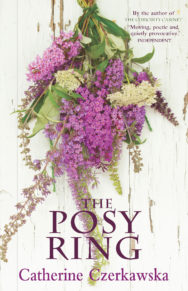‘When antiques seller Daisy Graham inherits an ancient house on the Hebridean island of Garve, she’s daunted by its size and isolation. But the building, its jumble of contents, its wilderness of a garden and the island itself prove themselves so fascinating that she’s soon captivated. She’s also attracted to Cal Galbraith, who is showing an evident interest in the house and its new owner, yet she’s suspicious of his motives – with good reason, it seems.’
In parallel with their story runs that of sixteenth-century cousins Mateo and Francisco, survivors from the ill-fated Spanish Armada who find safe passage to the island.There, one of them falls in love with the laird’s daughter. The precious gold posy (poesy) ring he gives her is found centuries later. Are its haunting engraved mottoes, un temps viendra and vous et nul autre, somehow significant now for Daisy and Cal?
Extract from The Posy Ring
By Catherine Czerkawska
Published by Saraband
When the solicitor’s letter came, she had been doubtful at first, wondering if it was a hoax. She had called her father. He was playing at some festival down south. It’s what he does. One of the grand old men of folk. That’s what they call him, although he doesn’t think of himself as particularly old and he isn’t. Perhaps it’s just that he seems to have been performing, playing the fiddle, for years.
‘I’m a baby boomer,’ he says, grinning. ‘We don’t get old.’
The young fans like him, give him the kind of respect that would have amused him when he was a young musician himself. Now he tolerates it. He has always been a kindly man. His music matters more to him than almost anything else. Except for Jessica May. Except for his daughter. After his wife died, he had sold the van, moved to Glasgow for a while, rented a flat so that Daisy could go to school. He had taken whatever work he could find and he had been reasonably successful. When the landlord decided to sell the tiny West End flat, he had managed to buy it so that Daisy would always have somewhere to call home. There had been gigs in pubs, session music, private tutoring. One year – a good year – he had played for a television advertisement and as well as the mortgage, that had bought Daisy new clothes, a bike, a school skiing trip. He played the fiddle, people said, as though he had sold his soul to the devil. Perhaps he had. He still does. But everyone knows the devil has all the best tunes.
She had read the letter aloud to him over the phone. There was a long silence. He sighed.
‘Auchenblae,’ he said. ‘It means Flowerfield, I think. In Gaelic.’
‘Yes. The house. My grandmother died and, Dad, she left the house to me. Viola’s left everything to me. I had no idea. No idea it was hers. You never said a word. Never told me where Mum used to live. Gone away, you said. Lost touch. Why didn’t you tell me, Dad? I could have found her. Could have visited her. Could have got to know her.’ She could hear the resentment in her voice and tried to moderate it. He had never been less than caring where she was concerned. He must have had his reasons.
‘I didn’t know she was still alive. I didn’t see how she could be, really. She must have been a great age.’
‘She was. But that day. That day when we walked up the hill. That day when we made the wish. She would have been alive then. Viola. She would have been there then.’
‘Maybe. Probably. Yes.’
‘You wouldn’t let me stop. You never told me you even knew the place. Why?’
‘To tell you the truth, I was afraid, Daisy. I was afraid.’
‘Of what, for goodness sake?’
‘Of losing you.’
‘How could you have lost me?’
‘Your mother was so ill. But she wouldn’t give in. I thought, if Viola knew, she would have wanted you. And back then, she might have got you. Your mother was dying, Daisy. I knew that. They wouldn’t have left you with me. Not if Viola had stepped in.’
‘I don’t see what difference that would have made. She was only my grandmother. You were my dad. Nobody could have kept us apart.’
‘I think they could have. I was a bit of a mess. After your mother died. And even before.’
‘You weren’t.’
‘Oh, I was. I was, you know. But I’m glad I never let you see it. Glad you never knew. She might have got you. You didn’t know her. I never knew her well. Jess wouldn’t have it. But Viola was a strong-minded woman. Like your mother. Once she set her heart on something, nothing would stop her. And that was just like your mother. I was so frightened of losing you. I’d lost your mother. I couldn’t lose you as well.’
Daisy paused. She could barely take it in. ‘So why did we go back at all? Why did we risk it?’
‘Desperation. I’d have tried anything. I remembered the hill and the Clootie Tree. Your mother talked about it. She asked me if I would go. How could I refuse?’
‘The wish,’ she said, after a while. ‘Did you ever think the wish would work?’
‘No. Not really. I knew it wouldn’t work. Except…’ He hesitated.
‘What?’
‘Because I knew it wouldn’t work, because I knew how ill your mother really was, I kind of made another wish. A different one. It was a supplementary wish, if you like. I thought I might be allowed one more. In the circumstances. One for luck. That’s the way magic works, isn’t it? Tricky.’
‘What kind of wish?’ She was intrigued now, in spite of her shock, her anger. Besides, she loved him. Could never stop loving him.
‘Not for myself. Or for your mother. Just for you.’
‘And did it work? Did that one come true?’
‘You tell me. Are you happy? Happy enough, anyway?’
‘Of course I’m happy. You made sure of that.’
He had too. He had given her as much security as his wandering soul could manage. He had given her unstinting love and support. An education. Self-respect. What more could she ask?
‘Sometimes these things take time,’ he said.T
The phone crackled a little. He would be somewhere in a sea of mud, with his new van and his old fiddle. There would be a new woman too. There always was. He was still an attractive man. Although in that respect, he had waited until Daisy grew up, waited until she had gone to university. She could hear music in the background. The thin sounds of a whistle. A bodhrán. A woman singing.
‘Sometimes they take years.’
‘What do?’
‘Spells,’ he said. ‘Wishes. Sometimes they take years to come true.’
The Posy Ring by Catherine Czerkawska is published by Saraband and available now priced £8.99.
ALSO IN THIS ISSUE

 Lost Objects
Lost Objects
‘”An intriguing and illuminating first collection, chockfull of interesting ideas about the natural …














